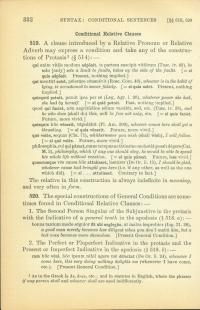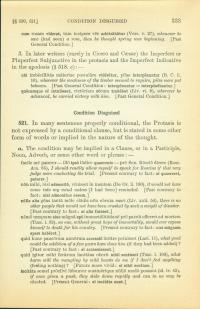519. A clause introduced by a relative pronoun or relative adverb may express a condition and take any of the constructions of protasis1 (§ 514).
Quī enim vitiīs modum adpōnit, is partem suscipit vitiōrum. (Tusc. 4.42)
He who [only] sets a limit to faults, takes up the side of the faults.
[ = sī quis adpōnit. Present, nothing implied.]
Quī mentīrī solet, pēierāre cōnsuēvit. (Rosc. Com. 46)
Whoever is in the habit of lying, is accustomed to swear falsely.
[= sī quis solet. Present, nothing implied.]
Quicquid potuit, potuit ipsa per sē. (Leg. Agr. 1.20)
Whatever power she had, she had by herself.
[ = sī quid potuit. Past, nothing implied.]
quod quī faciet, nōn aegritūdine sōlum vacābit, sed, etc (Tusc. 4.38)
and he who does (shall do) this, will be free not only, etc.
[ = sī quis faciet. Future More Vivid.]
Quisquis hūc vēnerit, vāpulābit. (Pl. Am. 309)
Whoever comes here shall get a thrashing.
[= sī quis vēnerit. Future More Vivid.]
Quō volēs, sequar. (Clu. 71)
Whithersoever you wish (shall wish), I will follow.
[ = sī quō volēs. Future More Vivid.]
philosophia, cui quī pāreat, omne tempus aetātis sine molestiā possit dēgere (Cat. M. 2)
philosophy, which if any one should obey, he would be able to spend his whole life without vexation
[ = sī quis pāreat. Future Less Vivid.]
Quaecumque vōs causa hūc attulisset, laetārer. (De Or. 2.15)
I should be glad whatever cause had brought you here.
(i.e. if any other, as well as the one which did)
[ = sī . . . attulisset. Contrary to Fact.]
The relative in this construction is always indefinite in meaning, and very often in form.
520. The special constructions of General Conditions are sometimes found in Conditional Relative Clauses.
- The 2nd erson Sisngular of the subjunctive in the protasis with the indicative of a general truth in the apodosis (§ 518.a).
Bonus tantum modo sēgnior fit ubi neglegās, at malus improbior. (Iug. 31.28)
A good man merely becomes less diligent when you don't watch him, but a bad man becomes more shameless.
[Present General Condition] - The perfect or pluperfect indicative in the protasis and the present or imperfect indicative in the apodosis (§ 518.b).
Cum hūc vēnī, hōc ipsum nihil agere mē dēlectat. (De Or. 2.24)
Whenever I come here, this very doing nothing delights me
(whenever I have come, etc.).
[Present General Condition]Cum rosam vīderat, tum incipere vēr arbitrābātur. (Verr. 5.27)
Whenever he saw (had seen) a rose, then he thought spring was beginning.
[Past General Condition] - In later writers (rarely in Cicero and Cæsar) the imperfect or pluperfect subjunctive in the protasis and the imperfect indicative in the apodosis (§ 518.c).
Ubi imbēcillitās māteriae postulāre vidērētur, pīlae interpōnuntur. (B. C. 2.16)
Wherever the weakness of the timber seemed to require, piles were put between.
[Past General Condition: interpōnuntur = interpōnēbantur]Quōcumque sē intulisset, victōriam sēcum trahēbat.(Liv. 6.8)
Wherever he advanced, he carried victory with him.
[Past General Condition]Footnotes
1. As in the Greek ὂς ἂν, ὅταν, etc.; and in statutes in English, where the phrases if any person shall and whoever shall are used indifferently.


